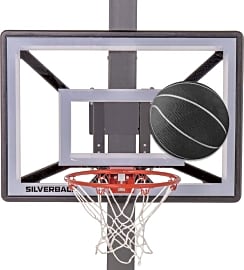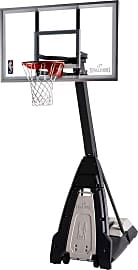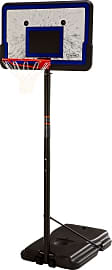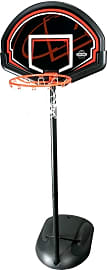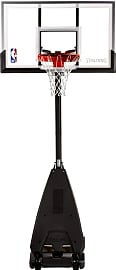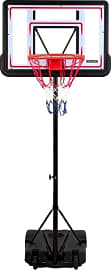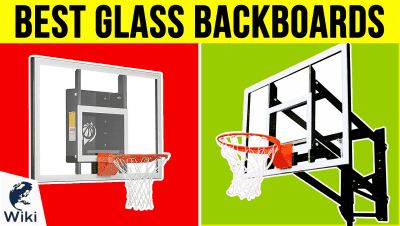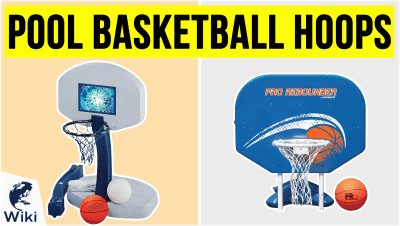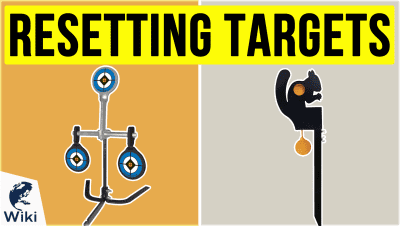The 10 Best Portable Basketball Hoops

This wiki has been updated 44 times since it was first published in May of 2015. A portable basketball hoop is a great option for many players in residential areas, because not everyone has the space or ability to install a fixed, in-ground model. These are available at prices to meet most budgets, with useful features like adjustable heights and breakaway rims. And if they need to be moved, you can simply roll most of them easily on their built-in wheels. When users buy our independently chosen editorial choices, we may earn commissions to help fund the Wiki.
Editor's Notes
July 16, 2021:
Traditional portable hoops are pretty similar, with a classic base/upright/backboard design that varies in stability and adjustment range. We want to take a second to mention the novel Silverback Lock ‘n Rock, though. If you're up for a little guerilla miniature basketball, this interesting option can turn any solid upright — round or square — into a dependable basketball hoop. With the right pole, it can be every bit as solid as a fixed model. For what it's worth, we're so confident in our selections that we haven't made any changes this time around.
July 21, 2020:
We eliminated a few items due to quality concerns, and we replaced the Silverback NXT with the latest version of that hoop. The base is exceptionally heavy duty, which gives it a bit more stability than many similar models.
We noticed few complaints about the performance of the Lifetime Youth, but we did indicate that the assembly instructions are confusing to some, which can be frustrating for those who aren’t very handy. In the listing for the Step2 Shootin' Hoops Pro, we added that the base has built-in water bottle holders, a useful little feature that rarely goes unappreciated. We also pointed out that unlike most portable hoops, the Lifetime 1269 is offered in three different color combinations.
Two of our new additions — the Pexmor Teen and the Silverback Lock ‘n Rock — are built primarily for kids. We wouldn’t describe the Pexmor basket as rock solid, but it’s suitable for shooting hoops and playing games like knockout and horse with the neighborhood kids. The Lock ‘n Rock differs from the rest of the list in that there is no pole or base included; instead, you mount it directly to an existing post or pole. This gives you plenty of flexibility in terms of where you can set it up, and it remains securely in place once it’s mounted.
We've indicated that The Beast by Spalding has a glass backboard, which is not common for portable baskets.
April 15, 2019:
If you're unable, for whatever reason, to erect a fixed basketball goal, there are plenty of good options in the portable realm. They can't quite match the rigidity and rebounding consistency of a good, cement-based unit, but some of them come awfully close. For example, the Silverback NXT is remarkably stable and it's not even close to the most expensive. Spalding's The Beast is, actually, about as costly as they come, but that's for a reason. It's a fantastic choice. It is, however, a considerable chore to put together. But it's about as good as they get, and for dedicated players who just can't install a permanent setup, it's a great choice. Spalding's Pro Slam and NBA models are of nearly as good of quality, only slightly less stable, and considerably less expensive. Franklin also offers an excellent unit at a mid-range price point, though as far as portability goes, well, it's apparently one of the most difficult to actually put away when you're done hooping.
Over on the more budget-oriented side of things, Lifetime has a number of reasonably priced options, it just depends on how authentic of an experience you're looking for and how much you want to spend. They get a little shakier and less consistent, but also quite a bit less expensive, going from the 1558, through the 1269, to the 1221 Pro Court editions. If you're looking to accommodate particularly young players, the Lifetime Youth is good for preteens, while the Step2 exists to introduce the littlest of tykes to the game of basketball. And keep in mind that most of these will require at least a few tools and a little bit of know-how to assemble.
Special Honors
First Team Goals First Team offers a nice selection of baskets, most of which are available with either clear acrylic or tempered glass backboards. Some allow for hanging on the rim, which is unusual for a portable hoop, and several are powder-coated to withstand the elements. Others, like the Thunder, are designed for use in an indoor gym. firstteaminc.com
Schelde Sports From compact and highly mobile hoops to high-end systems intended for use on main courts during league play, Schelde has something for everyone. They even offer a couple models designed specifically for three-on-three tournaments, with tough reinforced glass and the ability to customize the graphics on the padding. scheldesports.com
Bison Basketball Bison’s Club Court line of portable hoops are sturdy and relatively basic, with small backboards that make them ideal for physical education class or youth camps. On the other end of the spectrum, their T-Rex baskets are huge and professional in style, making them suitable for highly competitive leagues. bisoninc.com
How To Choose A Portable Hoop
If you have a beginner or intermediate player, an acrylic backboard is the next step up.
Portable hoops are widely popular for their convenience, versatility, and flexibility. They offer your budding NBA star a way to improve their skills without having to travel to a gym. Whether you're looking to purchase one for after school fun or spark up some competitive games with your work friends, there are several things to consider before clicking that buy button.
First, decide on your budget. Hoops can widely range in cost. Once you decide on your price range, the planned location of the hoop should be taken into account. Typically, a wide flat surface, like a driveway, is your best bet. No matter what location you decide on, measure the area. It is a key factor in determining which model you choose. Portable units may have backboards ranging in size from 48 to 72 inches. There are also kids' and junior models available that are considerably smaller. For reference, a regulation backboard is 72 inches wide by 42 inches tall. Also, consider the size and shape of the base. If the hoop will be used mainly for recreational fun, a smaller option may suffice, as it only requires a few feet of room. If you're looking for a more competitive setup, it will require significantly more space.
The next thing you'll want to look at is the backboard material. For very young children, a graphite and polyethylene backboard is the ideal choice due to its durability and less expensive price tag. If you have a beginner or intermediate player, an acrylic backboard is the next step up. It has a clear surface similar to glass, but is virtually unbreakable, making it the perfect material for outdoor use. If advanced level competition is what you're after, a tempered glass backboard is the optimal choice. This material is used in high schools, colleges, and professional arenas for its high performing capabilities. It offers the least amount of vibration and has a great bounce back of the ball for aggressive players.
The last component to consider is the height adjustment mechanism. There are five different types to choose from, including the telescoping pole, broomstick, trigger handle, pneumatic, and crank handle. Each one has its pros and cons. If you're looking for the ultimate in convenience, the trigger handle is one of the most popular choices, as it offers single-handed operation to move the hoop up or down in a swift motion. It is ideal for big families with children of various ages who require a hoop at different heights.
Is A Portable Or Fixed Hoop Better?
There are three types of basketball hoops that can be set up in your front or backyard for enjoyment: in-ground, portable, and pool. Pool basketball hoops are in a league of their own, however, and cannot be compared to the other two styles. So for our purposes, we will just look at the advantages and disadvantages of portable and in-ground models.
There are three types of basketball hoops that can be set up in your front or backyard for enjoyment: in-ground, portable, and pool.
The number one reason most families opt for a portable hoop is because of its mobility. They feature wheels underneath the base that make them extremely convenient to move around as needed. Another key feature is their ability to adjust in height, which allows the unit to grow with your child. Portable units are usually significantly less expensive than in-ground systems, as well. In-ground basketball hoops require a laborious installation, whereas portable models can be quickly filled with sand or water and the games can begin. For those living in an area with a home owner's association, there may be restrictions against in-ground models that often don't apply to portable units.
There are some disadvantages to a portable hoop, though. These include a lack of stability for aggressive players and that they are often slightly less durable than in-ground models. Even after the base has been filled with water or sand, they may still wobble more than in-ground units. This means that if you have a serious dunker on your hands, you may want to consider an in-ground hoop. These have a more traditional feel that serious players will appreciate and they stand firm to the ground, no matter what.
For most homes, a portable unit will more than suffice. This is doubly true if you aren't living in your forever home and may wind up moving in a couple of years. In this scenario, you would have to leave behind an in-ground model, while you could easily pack up a portable unit and take it along with the rest of your belongings.
How To Ensure A Safe Playing Area
Adding a basketball hoop to your home is a great way to increase your family's level of physical activity while promoting healthy, competitive play. Engaging your child in any type of physical activity is beneficial, but basketball offers the added benefit of getting yourself and your children outdoors, enjoying fresh air and sunlight. As with any rigorous play, though, there is a risk of injury. Here are a few precautions you can take to mitigate this possibility and reduce any danger to players.
Here are a few precautions you can take to mitigate this possibility and reduce any danger to players.
Consider where your basketball hoop is set up. It should be placed on a flat, even playing area. Cracks or tree roots making their way through concrete can cause a serious tripping hazard. Either move the unit to a different area or consider hiring a specialist to smooth out the ground. If your hoop is set up in a limited playing area, there may be a chance that your child will run into the pole, especially if he or she likes to drive to the basket. Investing in a pole pad may be worth your while. It is usually made of a foam filled vinyl that wraps around the pole to offer a cushioned surface should someone collide with it.
Another great investment is a rollback net. Everyone loves to shoot, but no one likes to retrieve. A basketball return system reduces the need to run after the ball, which is essential if your system is set up where cars drive by. Identifying these and any other potential risks is a surefire way to keep kids playing for hours in the safest way possible.



